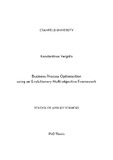JavaScript is disabled for your browser. Some features of this site may not work without it.
| dc.contributor.advisor | Tiwari, Ashutosh | |
| dc.contributor.author | Vergidis, K. | |
| dc.date.accessioned | 2010-01-05T15:02:19Z | |
| dc.date.available | 2010-01-05T15:02:19Z | |
| dc.date.issued | 2008-11 | |
| dc.identifier.uri | http://hdl.handle.net/1826/4096 | |
| dc.description.abstract | In response to the increasingly volatile and competitive environment, organisations are examining how their core business processes may be redesigned in order to improve business performance and market responsiveness. However, there is a lack of holistic approaches towards business process redesign through optimisation. The aim of this research is to develop an evolutionary multi-objective optimisation framework for business processes capable of: (i) representing business process designs in a quantitative way, (ii) algorithmically composing designs based on specific process requirements and (iii) identifying the optimal processes utilising evolutionary algorithms. A literature survey of business process definitions, modelling, analysis and optimisation techniques provides an overview of the current state of research and highlights the gap in business process optimisation. An industry survey within the service sector grounds the research within the industrial context and compares the real-life issues related to business processes with the literature findings. This research proposes a representation technique for business process designs using both a visual and a quantitative perspective. It also proposes the Process Composition Algorithm (PCA) – an algorithm for composing new business process designs. The proposed business process optimisation framework (bpoF) lies at the heart of this research and employs the representation technique, PCA and a series of state-of-the-art evolutionary optimisation algorithms. The framework is capable of generating a series of alternative optimised business process designs based on given requirements. A strategy for creating experimental business process scenarios is also proposed by this research. The proposed strategy provides the opportunity of assessing both the capability of the framework in optimising challenging business process scenarios and the performance of the evolutionary algorithms. Finally, a set of real-life business process scenarios is prepared using the proposed representation in order to validate the optimisation framework. Also, a workshop with a series of business process experts assesses the capability of the framework in dealing with these real-life scenarios. In this way, this research proposes a fully tested and validated methodology for capturing, representing and optimising business process designs. | en_UK |
| dc.language.iso | en | en_UK |
| dc.publisher | Cranfield University | en_UK |
| dc.title | Business process optimisation using an evolutionary multi-objective framework | en_UK |
| dc.type | Thesis or dissertation | en_UK |
| dc.type.qualificationlevel | Doctoral | en_UK |
| dc.type.qualificationname | PhD | en_UK |
